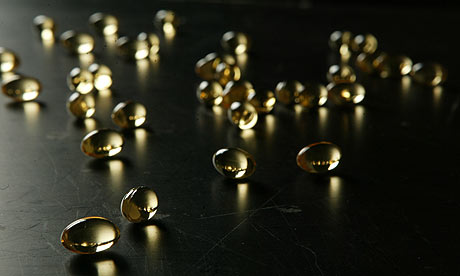A Science News Aggregator That Covers Stories in the World Of Science And Technology.
Showing posts with label aging. Show all posts
Showing posts with label aging. Show all posts
Monday, February 8, 2010
For The First Time, Researchers Find Longevity Gene That Helps Determine Lifespan
From Popular Science:
Humanity's search for the secrets to immortality has inspired Ray Kurzweil's Singularity vision and DARPA's hunt for ageless synthetic beings. Now scientists have discovered a single gene that appears to control how quickly individuals will biologically age, The Telegraph reports. The discovery could not only encourage people to adopt healthier lifestyles earlier, but may eventually help people live longer if scientists can figure out how to manipulate the gene.
Read more ....
Cells Send Dirty Laundry Home to Mom
 Bright green protein aggregates are transported from the young daughter cell into the larger mother cell using conveyor-like structures called actin cables. (Credit: University of Gothenburg)
Bright green protein aggregates are transported from the young daughter cell into the larger mother cell using conveyor-like structures called actin cables. (Credit: University of Gothenburg)From Science Daily:
ScienceDaily (Feb. 8, 2010) — Understanding how aged and damaged mother cells manage to form new and undamaged daughter cells is one of the toughest riddles of ageing, but scientists now know how yeast cells do it. In a groundbreaking study researchers from the University of Gothenburg, Sweden, show how the daughter cell uses a mechanical "conveyor belt" to dump damaged proteins in the mother cell.
Read more ....
Monday, February 1, 2010
Young Blood Reverses Signs Of Aging In Old Mice
 Photo: Blood rebirth: Over time, blood stem cells (shown in green) lose their ability to replenish blood. Researchers have discovered that exposing old mice to circulating blood from younger mice restores this ability. Credit: Amy Wagers
Photo: Blood rebirth: Over time, blood stem cells (shown in green) lose their ability to replenish blood. Researchers have discovered that exposing old mice to circulating blood from younger mice restores this ability. Credit: Amy Wagers From Technology Review:
A mysterious substance in blood rejuvenates blood-forming stem cells.
The antiaging power of blood might not be just the stuff of vampire stories. According to new research from Harvard University, an unspecified factor in the blood of young mice can reverse signs of aging in the circulatory system of older ones. It's not yet clear how these changes affect the animals' overall health or longevity. But the research provides hope that some aspects of aging, such as the age-related decline in the ability to fight infection, might be avoidable.
Read more ....
Sunday, January 24, 2010
Scientists Announce The End Of The Mid-Life Crisis: Life Really Does Begin At 40, They Say
From The Daily Telegraph:
Life really can begin at 40, an expert claimed yesterday.
Improvements in healthcare, education and life expectancy have made the mid-life crisis a thing of the past, according to psychologist Dr Carlo Strenger.
'Somehow this line has been drawn around the mid and late 40s as a time for a mid-life crisis in our society,' he said.
Read more ....
Thursday, January 21, 2010
Fish Oil Slows Burn Of Genetic Fuse In Ageing, Say Scientists
From The Guardian:
Omega-3 fatty acids from fish oils have a direct effect on biological ageing, US research suggests.
Fish oil may be the true elixir of youth, according to new evidence of its effect on biological ageing. Omega-3 fatty acids from fish oil preserve the genetic "fuse" that determines the lifespan of cells, say scientists.
The discovery, made in heart disease patients, may explain many of the claimed health benefits of omega-3.
Read more ....
Saturday, January 16, 2010
The Golden Oldie Gene: One In Five Has Age-Defying 'Centenarian Gene' That Greatly Increases Odds Of Living To 100
 Photo: Centenarian: The late Queen Mother at St Paul's Cathedral after a service in honour of her 100th birthday in 2000
Photo: Centenarian: The late Queen Mother at St Paul's Cathedral after a service in honour of her 100th birthday in 2000From The Daily Mail:
In the genetic lottery of life expectancy, you might think 100 is a pretty lucky number.
Now it's just got luckier.
Scientists have discovered that a gene already known to treble your odds of living to 100 may also ward off Alzheimer's disease.
One in five of us is dealt this genetic hand that promises to extend our lives without the loss of mental agility.
The gene is the first to be identified that actually cuts the odds of Alzheimer's disease rather than raising them.
Read more ....
Saturday, December 26, 2009
Calorie Restriction: Scientists Take Important Step Toward 'Fountain Of Youth'
From Science Daily:
Science Daily (Dec. 26, 2009) — Going back for a second dessert after your holiday meal might not be the best strategy for living a long, cancer-free life say researchers from the University of Alabama at Birmingham. That's because they've shown exactly how restricted calorie diets -- specifically in the form of restricted glucose -- help human cells live longer.
This discovery, published online in The FASEB Journal, could help lead to drugs and treatments that slow human aging and prevent cancer.
Read more ....
Tuesday, December 22, 2009
Scrubby Oak Lauded As Oldest Known Living Organism
 Mike Cipra, a desert program manager for the National Parks Conservation Association, examines a burned Joshua tree that shows signs of growth earlier this month. Scientists say the effects of global warming could make Joshuas extinct within a century. Kurt Miller / The Press-Enterprise
Mike Cipra, a desert program manager for the National Parks Conservation Association, examines a burned Joshua tree that shows signs of growth earlier this month. Scientists say the effects of global warming could make Joshuas extinct within a century. Kurt Miller / The Press-EnterpriseFrom The Independent:
It began life during the last ice age, long before man turned to agriculture and built the first cities in the fertile crescent of the Middle East. It was already thousands of years old when the Egyptians built their pyramids and the ancient Britons erected Stonehenge.
The Jurupa Oak tree first sprouted into life when much of the world was still covered in glaciers. It has stood on its windswept hillside in southern California for at least 13,000 years, making it the oldest known living organism, according to a study published today.
Read more ....
Tuesday, December 15, 2009
People Who Look Young For Their Age 'Live Longer'
 Photo: Fresh-faced actor Leonardo Di Caprio might expect a long life.
Photo: Fresh-faced actor Leonardo Di Caprio might expect a long life.From BBC News:
People blessed with youthful faces are more likely to live to a ripe old age than those who look more than their years, work shows.
Danish scientists say appearance alone can predict survival, after they studied 387 pairs of twins.
The researchers asked nurses, trainee teachers and peers to guess the age of the twins from mug shots.
Those rated younger-looking tended to outlive their older-looking sibling, the British Medical Journal reports.
Read more ....
Why Humans Outlive Apes
 Chimps and apes are genetically so similar to humans - and their human-like gestures do remind us how close we are on the family tree - that scientists have long been puzzled why they don't live as long as we do. Diet-related evolutionary changes may explain it. Image credit: stockexpert.
Chimps and apes are genetically so similar to humans - and their human-like gestures do remind us how close we are on the family tree - that scientists have long been puzzled why they don't live as long as we do. Diet-related evolutionary changes may explain it. Image credit: stockexpert.From Live Science:
Genetic changes that apparently allow humans to live longer than any other primate may be rooted in a more carnivorous diet.
These changes may also promote brain development and make us less vulnerable to diseases of aging, such as cancer, heart disease and dementia.
Read more ....
Thursday, December 3, 2009
Why Humans Outlive Apes: Human Genes Have Adapted to Inflammation, But We Are More Susceptible To Diseases Of Aging
 A baby chimp (Pan troglodytes) and his handler looking at each other. (Credit: iStockphoto/Warwick Lister-Kaye)
A baby chimp (Pan troglodytes) and his handler looking at each other. (Credit: iStockphoto/Warwick Lister-Kaye)From Science Daily:
Science Daily (Dec. 3, 2009) — In spite of their genetic similarity to humans, chimpanzees and great apes have maximum lifespans that rarely exceed 50 years. The difference, explains USC Davis School of Gerontology Professor Caleb Finch, is that as humans evolved genes that enabled them to better adjust to levels of infection and inflammation and to the high cholesterol levels of their meat rich diets.
Read more ....
Why Women Live So Much Longer Than Men (And, No, It's Not Because They Have An Easier Life!)
From The Daily Mail:
In the battle of the sexes, women have always played the ultimate long game - by outliving men.
But there's no point crowing about the powers of female stoicism and endurance.
Scientists now believe women squeeze that extra five years out of life simply because men are made of different stuff.
Read more ....
Tuesday, December 1, 2009
Exercise Prevents Aging of Cells

From Live Science:
Exercise is known to have a bounty of health benefits that can ward off age-related diseases, but a new study shows that regular physical activity has an anti-aging effect at the cellular level.
The research found that intensive exercise prevents the shortening of telomeres — the DNA that bookends chromosomes and protects the ends from damage — much like the cap on the end of a shoelace.
Read more ....
Monday, November 23, 2009
Scientists Find Molecular Trigger That Helps Prevent Aging and Disease
 New research has unraveled a molecular puzzle to determine that within certain parameters, a lower-calorie diet slows the development of some age-related conditions such as Alzheimer's disease, as well as the aging process. (Credit: iStockphoto)
New research has unraveled a molecular puzzle to determine that within certain parameters, a lower-calorie diet slows the development of some age-related conditions such as Alzheimer's disease, as well as the aging process. (Credit: iStockphoto)From Science Daily:
Science Daily (Nov. 23, 2009) — Researchers at Mount Sinai School of Medicine set out to address a question that has been challenging scientists for years: How does dietary restriction produce protective effects against aging and disease? And the reverse: how does overconsumption accelerate age-related disease?
Read more ....
Blood And Guts: On The Brink Of A Revolution
 Susie Colbert, 33, has a prominent 5in scar as the result of breaking her arm in two places while whitewater rafting in 2006. 'I've accommodated the scar into my self-image now, but other people are still taken aback by it,' she says. Jason Alden
Susie Colbert, 33, has a prominent 5in scar as the result of breaking her arm in two places while whitewater rafting in 2006. 'I've accommodated the scar into my self-image now, but other people are still taken aback by it,' she says. Jason AldenFrom The Independent:
Scientists will soon be able to manufacture body tissue to order if clinical trials continue to yield promising results.
The future of British medical science looks bright, brilliant and very, very bold. Scientists have taken giant steps towards being able to manufacture new skin, blood and even new bones.
Read more ....
Sunday, November 22, 2009
Life Expectancy And The Dangers Of Defying Death
 The hands of a century old pensioner (101 years) in the day room of Manor croft care home in Fareham. The state pension is 100 years old this year. (Richard Pohle/The Times)
The hands of a century old pensioner (101 years) in the day room of Manor croft care home in Fareham. The state pension is 100 years old this year. (Richard Pohle/The Times)From Times Online:
Understanding and predicting longevity are vital if we are to manage the implications of greater life expectancy.
There’s been a lot of news recently about dying — or, more exactly, about surviving. According to figures for 2006-08 just published by the Office for National Statistics, life expectancy at birth in the Royal Borough of Kensington and Chelsea, West London, has reached 84.3 years for males, 88.9 for females.
Read more ....
Monday, November 16, 2009
Scientists Identify Gene That Can Help You Live To 100

From The Telegraph:
A gene that can help you live to 100 has been identified by scientists.
Researchers studying a group of people with an average age of 97 found they had all inherited a gene that appears to prevent cells ageing.
They found that the 86 people studied and their children had higher levels of an enzyme called telomerase which is known to protect the body's DNA from degrading.
Read more ....
Sunday, November 15, 2009
Longevity Tied to Genes That Preserve Tips of Chromosomes
 Researchers have found a clear link between living to 100 and inheriting a hyperactive version of an enzyme that rebuilds telomeres -- the tip ends of chromosomes. (Credit: iStockphoto/Felix Möckel)
Researchers have found a clear link between living to 100 and inheriting a hyperactive version of an enzyme that rebuilds telomeres -- the tip ends of chromosomes. (Credit: iStockphoto/Felix Möckel)From Science Daily:
Science Daily (Nov. 15, 2009) — A team led by researchers at Albert Einstein College of Medicine of Yeshiva University has found a clear link between living to 100 and inheriting a hyperactive version of an enzyme that rebuilds telomeres -- the tip ends of chromosomes.
The findings appear in a recent issue of the Proceedings of the National Academy of Sciences.
Read more ....
Thursday, November 12, 2009
One Key Found For Living To 100

From Live Science:
Scientists have zeroed in on one apparent key to long life: an inherited cellular repair mechanism that thwarts aging and perhaps helps prevent disease. Researches say the finding could lead to anti-aging drugs.
The study involves telomeres, the ends of chromosomes that have been likened to the plastic tips that prevent shoelaces from unraveling. Telomeres were already known to play a key role in aging, and their discovery led to this year's Nobel Prize in medicine.
Read more ....
Wednesday, November 11, 2009
Retiring 'Makes You Feel 10 Years Younger'

From The Telegraph:
Workers feel ten years younger after they retire, according to a study that highlights the physical toll of lengthy careers.
Researchers analysed almost 15,000 employees and found that they felt increasingly less well in the years leading up to retirement, but significantly better after they stopped work.
The team behind the study said it showed that working conditions must be improved for older people if they are to be persuaded to remain economically active.
Read more ....
Subscribe to:
Posts (Atom)




